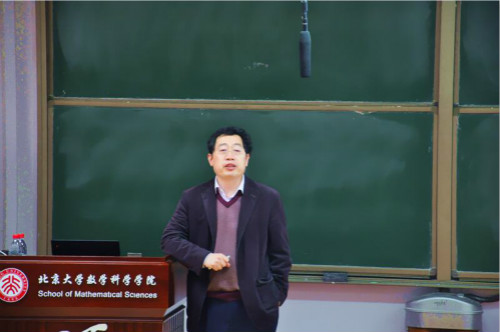
On November 15, 2017, Qiao Fangli, Secretary and Deputy Director of the party committee of National Bureau of Oceanography, was invited to make a report entitledThe challenge, Development and Prospect of Ocean and Climate Models in the No. 1 building of Science. Professor Zhang Pingwen, Academician of CAS and professor of Peking University, chaired this lecture.

Fangli Qiao

Pingwen Zhang
Researcher Qiao Fangli reviewed the development and core challenges of the research on ocean and climate models, and analyzed the future trends in the field respectively from five aspects, namely, the challenges of ocean and climate models, the development of ocean wave-tidal current coupling mode, the development of typhoon and climate models, the construction of business forecasting system, and the future development prospects. The content of the report is rich and wonderful, attracting teachers and students from more than 10 departments.
Researcher Qiao first introduced the location of marine environment science and numerical simulation laboratory, and highlighted the research direction of ocean and climate numerical model system. Then two main approaches to the study of the ocean were distinguished. He said that monitoring is the embodiment of a country's economic strength, and the model is a token of the level of a country's scientific research.
According to Qiao Fangli's research, the wave mixing theory has been applied in different oceanic general circulation models by more than ten research groups such as the ones in United States, Sweden, Britain, Germany, Australia, Hungary and China, which significantly improved its mode performance. And its independent development mode of marine all-element assimilation system also provides a solid technical foundation for the actual marine prediction system construction and climate prediction.
In the field of climate model development, researcher Qiao focused on the first global climate model FIO-ESM V1.0 that includes waves. The model has participated in the Coupled Model Intercomparison Project 5 (CMIP5), which is the first time to participate in the international coupling model comparison plan in the marine field of China.
Finally, he said that China's ocean and climate models are in a period of flight, and sincerely looked forward to the practical cooperation with Peking University.